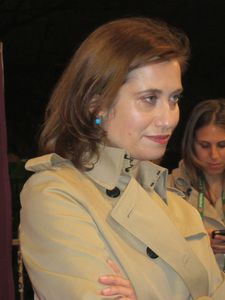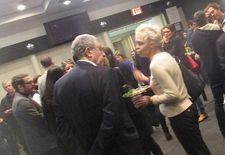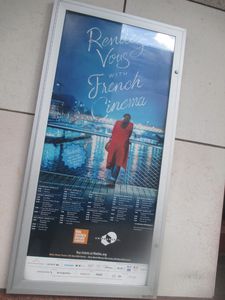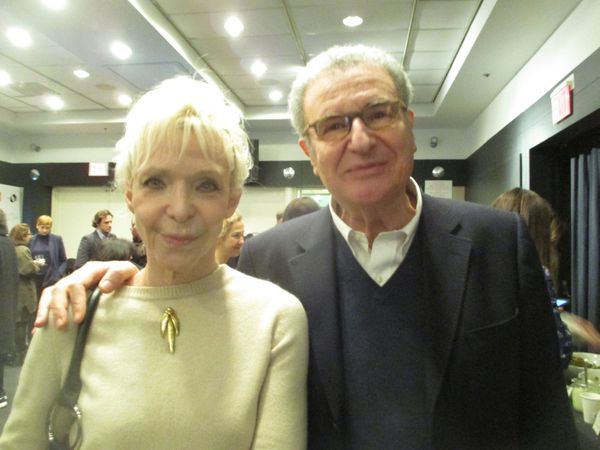At the uniFrance Rendez-Vous with French Cinema reception at the Film Society of Lincoln Center, attended by Bruno Dumont, Marine Francen, Xavier Legrand, Mathieu Amalric, and Jeanne Balibar, the new president of uniFrance, Serge Toubiana, introduced me to his longtime friend Tonie Marshall.
The director of Woman Up! (Numéro Une), which stars Emmanuelle Devos, expressed her personal concerns for the women of France and the film industry, when I brought up International Women's Day. She recounted her own difficulties in getting a project made (which never happened) and described in detail what she intends to do with the upcoming documentary that she is working on.
 |
| Tonie Marshall on Emmanuelle Devos: "She's a friend of mine and I really appreciate the way she thinks, the way she is an actress." Photo: Anne-Katrin Titze |
Anne-Katrin Titze: Yesterday was International Women's Day.
Tonie Marshall: Yeah, D-Day.
AKT: You have been tackling this subject for a long time, but this is the first time you were going into the world of business.
TM: Yes, because I wanted to make a TV series in 2009 about a women's network, a little bit like they are in the movie. There were eight lead characters, different ages, different characters. It was to show the obstacles women have in industry, in politics, sport, media, etc. No French TV wanted to do that series. No one! Everybody said it's not interesting.
AKT: Which year was that?
TM: 2009. It was a little bit before Borgen. Have you seen Borgen?
AKT: Oh, yes.
TM: It was maybe one year ahead. So I made different other things and suddenly in France, I don't know how it is here, there's a sort of religious point of view, moral. Abortion is again questioned. You know, it's a very strange time.
So I thought it was maybe the time to make a film about how it's difficult for a woman to go in a decision-making position. And in France the CAC 40 is a virgin field because there's no women at the head of companies.
AKT: When you bring up the issue of abortion, here too, things seem to be moving backwards.
TM: Forever it was not an issue. Maybe here [in the US] I heard about very strange associations, even murder, sometime. But in France, it was unbelievable. Recently there's been a Catholic group that are doing many things on the internet, saying fake news, you can't go to that hospital, etc.. Abortion is a question now. And it's incredible for me.
 |
| Emmanuelle Blachey (Emmanuelle Devos) with Véra Jacob (Suzanne Clément) in Numéro Une (Number One) |
AKT: It's very scary. These are scary times. What I found very touching in your film is Emmanuelle Devos' character's relationship to her mother. I don't want to give anything away. But how she explained her mother's decision making touched me deeply.
TM: It happened to my cousin. When I was 12 years old his mother disappeared. She was out on a boat and she disappeared and we never found her body. And I dreamed for years of her. I thought it was something for a young girl to think about a woman like that. Maybe she committed suicide because she couldn't find her place.
AKT: That's it. She couldn't find her place.
TM: That's what she says at the end in her speech. She says that her mother wanted to walk on the moon. She wanted to build the channel tunnel. She wanted to do everything that no woman could do when she was a young girl. And she wanted to do that for her mother, too.
AKT: It's a recognition of what hasn't been possible that is missing in many movies. You show it and this gives your film another layer, the mother's story in relation to the business woman.
TM: Sure. I think for some of us it's important that the mother serves as a role model.
AKT: When Emmanuelle told me about your film, she mentioned the clothes that she felt empowered by.
TM: Probably because in that kind of arena, the CAC 40, you have to go to the opera, you have to go to many places, ceremonies, etc.. So you have to be dressed in a dress code. There's a dress code in this field. So we worked a lot to be exact. Everything in my film is perfectly realistic.
 |
| Filmmakers at the uniFrance Rendez-Vous with French Cinema reception at the Film Society of Lincoln Center Photo: Anne-Katrin Titze |
And it's a little bit less misogynistic than it is in real life. In the first draft of the script we wrote some lines, real lines. It's impossible to make a film so realistic because it's going to be against men. And I don't want to make a film against men. I want men to understand what the problem is.
AKT: So you cleaned it up?
TM: A little bit.
AKT: The casting of Emmanuelle Devos for that role is perfect. You wanted her for that role?
TM: Yes, she is maybe the only one in France who gave me the certainty because she came from the elite French schools. And it's not easy to be believable.
AKT: She is very believable. Her choices of films are good. She told me that there are films offered to her where she knows she cannot play that role. Roles that are so counter to who she is. She gave the example of a mother abusing her child and that she doesn't want that to be out there with her face.
TM: I understand that. She's a friend of mine and I really appreciate the way she thinks, the way she is an actress. You can say to Emmanuelle "I've seen your film and, well …" It's easy with Emmanuelle to be in a true relationship and not only with compliments. I like her. I really do appreciate to be with her, to work with her, to talk with her. It's a partnership.
AKT: What are you working on now?
 |
| Rendez-Vous with French Cinema poster at the Film Society of Lincoln Center Photo: Anne-Katrin Titze |
TM: I am working on a documentary. A utopian documentary. Because with that film I've been in many ministries, talking with civil servants and it's really interesting. Men, women, questioning what's going to happen for equality. I don't know, but I have some intuition about what's happening now.
I want to make a documentary. It's a question but I don't have the answer. If capitalism had been invented by women, what it would be like? And I think it would be absolutely different. I want to confront my ideas and my intuitions with historians, economists, sociologists, philosophers.
AKT: Maybe it wouldn't have been called capitalism in the first place. The bank system in Iceland comes to mind, with so many banks run by women.
TM: It would have been completely different. It's impossible to go back, but it's possible to improve things.
AKT: The other big thing is that many people cannot even imagine anything but capitalism anymore. As if there were no alternatives to this system at all.
TM: Because socialism failed. Maybe capitalism isn't completely finished and closed off. I imagine that if there were 50% of women at decision-making positions, it would be a little bit different.






















